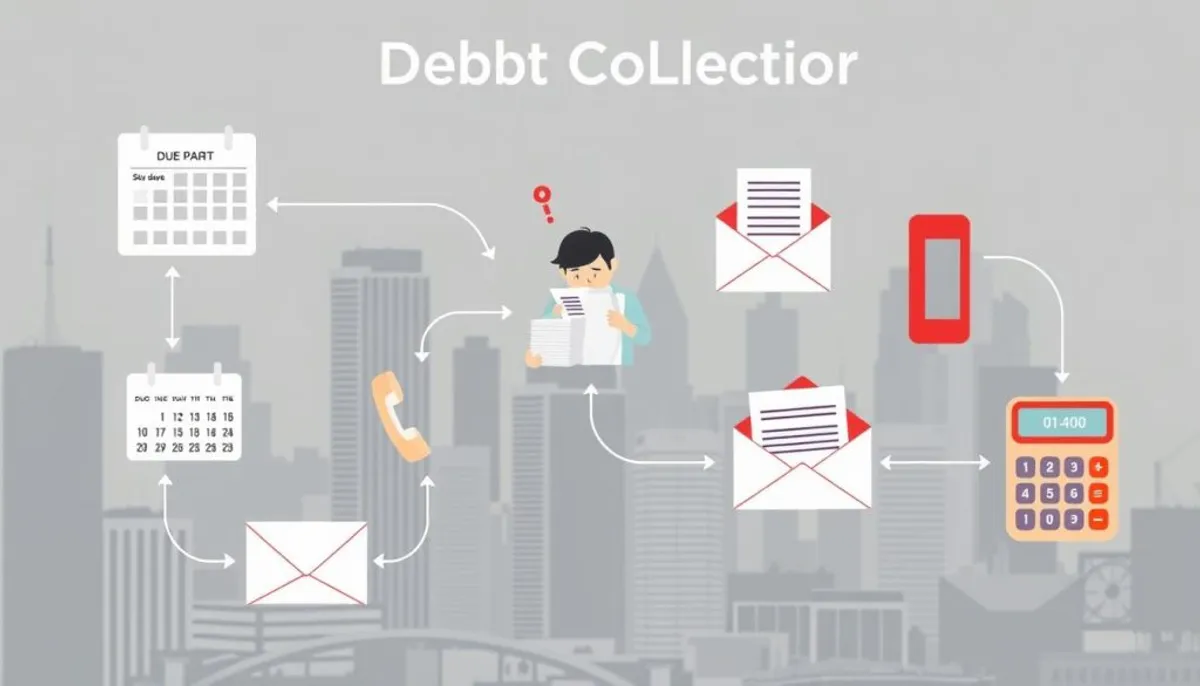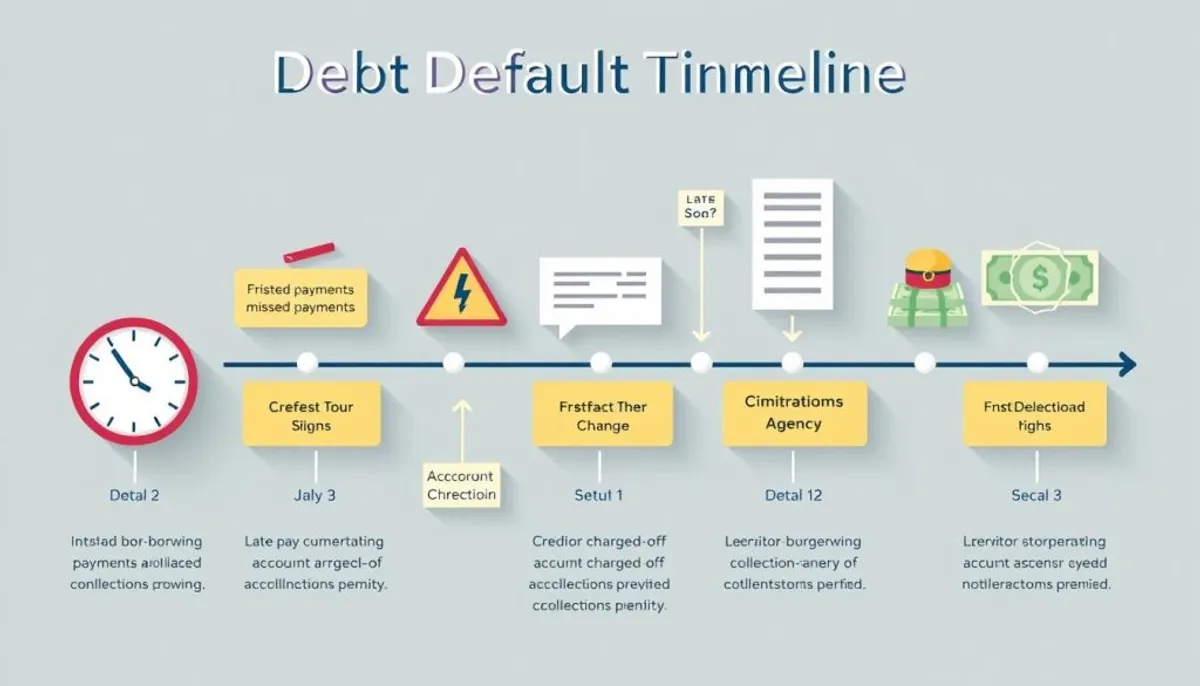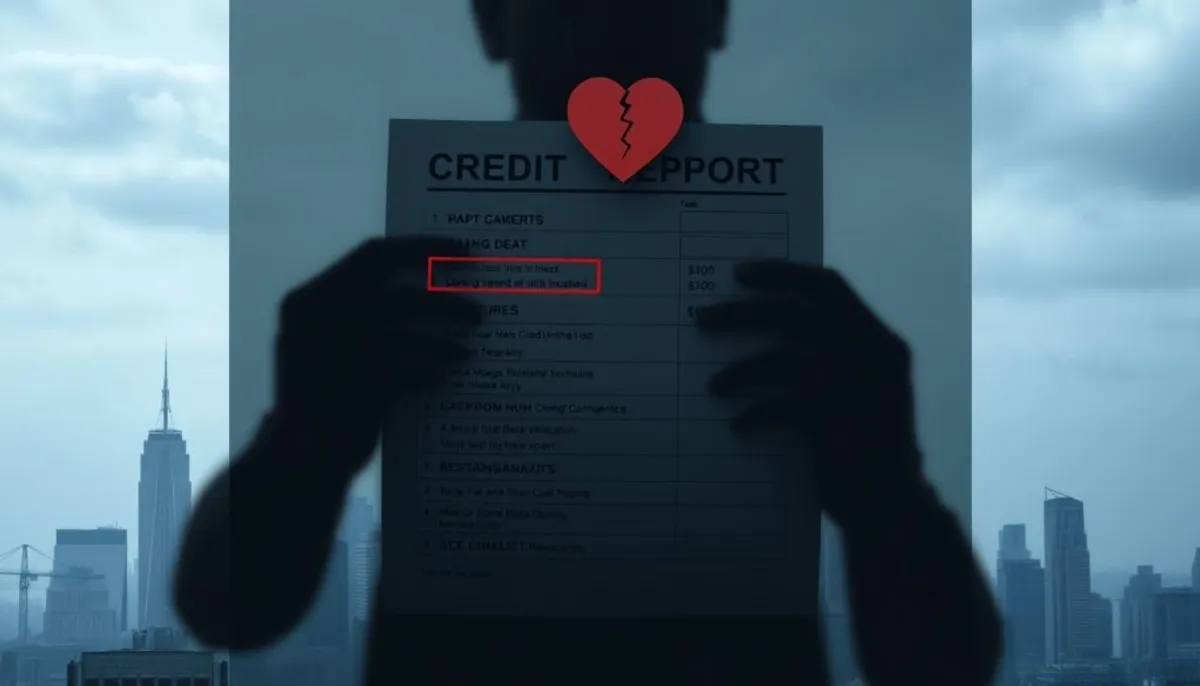Debt collection agencies are pivotal in the financial sector. They intervene when borrowers fail to meet their payment obligations, aiming to reclaim funds for creditors. The process involves a range of strategies, all subject to strict regulations to safeguard consumers.
Collection practices differ, but predominantly include phone calls and letters to engage with debtors. The goal is to encourage individuals to fulfill their financial commitments. Some agencies purchase debt outright, while others act as intermediaries for the original creditors.

The Fair Debt Collection Practices Act establishes clear guidelines for these agencies. It bars abusive practices and restricts the frequency of contact. Notwithstanding these regulations, the Federal Trade Commission still receives a significant number of complaints against debt collectors annually.
Agencies frequently accept partial payments, often between 25% to 50% of the original debt. This accommodation can benefit both parties. It enables debtors to manage their financial obligations, while agencies can efficiently close cases.
Key Takeaways
- Collection agencies employ diverse methods to recover debts
- The Fair Debt Collection Practices Act safeguards consumers
- Agencies may settle for less than the full debt amount
- Debt can impact credit scores for up to seven years
- Consumers possess rights and can report unfair practices
Understanding Debt Collection Agencies and Their Role
Debt collection agencies are pivotal in the financial sector. They aim to recover unpaid debts, either on behalf of creditors or by outright purchase. This exploration delves into the realm of debt collection and its consumer impact.
What is a Debt Collection Agency
Debt collection agencies focus on retrieving money owed to creditors. They intervene when debts are 60-90 days overdue. These entities either receive a percentage of the recovered sum or purchase the debt at a reduced price, striving to collect the full amount.
Types of Debts Collection Agencies Handle
Collection agencies manage a variety of debts:
- Credit card balances
- Medical bills
- Personal loans
- Utility bills
- Student loans
Diverse debt types necessitate tailored collection approaches, yet they are all bound by the same legal standards.
The Legal Framework of Debt Collection
The Fair Debt Collection Practices Act (FDCPA) regulates debt collection in the U.S. This legislation safeguards consumers against unfair practices. Key aspects include:
- Collectors can’t contact debtors before 8 a.m. or after 9 p.m.
- They’re limited to seven contacts in a seven-day period
- Collectors must verify debts when requested
- Harassment and false statements are prohibited
Grasping these regulations empowers consumers in their interactions with collection agencies.
| Aspect | Detail |
|---|---|
| Typical Collection Timeline | 60-90 days past due |
| Credit Report Impact | Up to 7 years |
| Legal Action Window | 4-6 years from default |
| Collector Contact Hours | 8 a.m. to 9 p.m. |
How Do Collection Agencies Work: The Collection Process
The debt collection process is a systematic method employed by collection agencies to reclaim unpaid debts. It commences when the original creditor delegates the debt to a collection agency. This delegation can occur through assignment or the outright sale of the debt.
Collection agencies employ diverse strategies to engage with debtors. They may dispatch letters, initiate phone calls, or leverage digital platforms for communication. Their primary objective is to confirm debt details and gauge the debtor’s financial standing.
During the negotiation phase, collection agencies strive to forge a repayment agreement. They must operate within the confines of the Fair Debt Collection Practices Act (FDCPA). This legislation safeguards consumers against exploitative collection tactics.
In the event of unsuccessful initial attempts, agencies may intensify their collection efforts. This escalation might involve increased communication frequency or legal proceedings. Yet, they must observe specific prohibitions:
- No contact before 8 a.m. or after 9 p.m.
- No discussing debts with unauthorized parties
- No abusive or harassing behavior
- No false threats of legal action
Collection agencies derive their income from a commission on the debts they successfully recover. This commission spans between 25% to 50% of the collected sum. The precise percentage is influenced by variables such as debt maturity and category.
| Stage | Action | Restrictions |
|---|---|---|
| Initial Contact | Verify debt, understand financial situation | Must respect communication time limits |
| Negotiation | Establish repayment plan | Follow FDCPA guidelines |
| Escalation | Increase communication, potential legal action | No abusive practices, false threats |
When Does a Debt Go to Collections?
Understanding the timeline of debt default and the process of debt transfer is crucial for anyone dealing with financial obligations. Let’s explore when a debt typically enters collections and how this process unfolds.
The Timeline from Default to Collections
A debt default usually occurs when a payment is 30 days past due. Creditors often wait longer before involving a collection agency. The journey from missed payment to collections can take about six months, though this varies based on the creditor and type of debt.

Transfer of Debt Rights
When a debt goes to collections, the original creditor may transfer the rights to collect. This debt transfer can happen in two ways: assignment or purchase. In an assignment, the creditor retains ownership but allows an agency to collect on their behalf.
Debt Purchase vs. Debt Assignment
Debt purchase occurs when a collection agency buys the debt outright. They typically pay a fraction of the debt’s value, often around 20-25% of the original amount. The agency then attempts to collect the full amount, keeping all recovered funds. This method is common for older debts, usually 60 days or more past due.
| Debt Transfer Method | Ownership | Collection Rights |
|---|---|---|
| Assignment | Original Creditor | Collection Agency |
| Purchase | Collection Agency | Collection Agency |
Remember, regardless of how a debt reaches collections, you have rights under the Fair Debt Collection Practices Act. This law protects you from abusive practices and gives you the right to verify the debt’s validity.
Legal Rights and Protections Under the FDCPA
The Fair Debt Collection Practices Act (FDCPA) is a cornerstone of consumer protection legislation. It establishes definitive guidelines for debt collectors, ensuring consumers are treated fairly throughout the collection process.
Debt collectors are subject to stringent regulations under the FDCPA. They are prohibited from contacting you before 8 a.m. or after 9 p.m. If you’re at work and it’s inconvenient, they must cease their calls. The act explicitly prohibits harassment and deceptive practices.
Your rights under the FDCPA include:
- Disputing inaccurate debt information
- Requesting debt verification
- Stopping contact if you have legal representation
- Protection from public posting about your debt on social media
The FDCPA seeks to harmonize the interests of honest debt collectors with consumer rights. It fosters consistent state action against abusive practices and ensures fair competition among collectors.
If a debt collector breaches these rules, you have the right to sue. You may recover damages and attorney fees. It’s important to note that most states have laws similar to the FDCPA, offering additional protections.
Understanding your rights under the Fair Debt Collection Practices Act empowers you to confidently navigate debt collection situations. It serves as a powerful tool in safeguarding your financial well-being and personal dignity.
Collection Agency Communication Methods
Debt collector communication is essential in the collection process. Agencies employ various contact methods to engage debtors and settle outstanding balances. We will examine the primary ways collection agencies interact with consumers.
Phone Calls and Letters
Traditional contact methods, such as phone calls and letters, remain vital in debt collection. Letters, sent via postal service, are often viewed as the most authoritative form of communication. Phone calls, on the other hand, facilitate personal interaction, enabling open discussions about the debt. During initial contact, agencies typically inform debtors of their involvement and provide details about the outstanding balance.
Digital Communication Channels
In today’s digital era, collection agencies are evolving their contact methods. They may employ emails or private social media messages to reach debtors. These digital channels offer convenience and rapid response times, enhancing traditional approaches.
Restrictions on Contact Times and Methods
The Fair Debt Collection Practices Act (FDCPA) imposes strict guidelines on debt collector communication. Agencies can only contact debtors between 8 a.m. and 9 p.m. They must cease calling a debtor’s workplace if it is not permitted. These regulations ensure fair practices and safeguard consumers from harassment.
| Contact Method | Advantages | Restrictions |
|---|---|---|
| Letters | Authoritative, provides written record | Must follow FDCPA guidelines |
| Phone Calls | Personal, allows for immediate discussion | Limited to 8 a.m. – 9 p.m., workplace restrictions |
| Digital Channels | Quick, convenient | Must comply with privacy laws |
Impact of Collections on Your Credit Score
Collections can significantly affect your credit score impact. When an account goes to collections, it typically appears on your credit report for seven years from the original delinquency date. This negative mark can lower your credit score and make it harder to get loans or credit cards.
Length of Collections on Credit Reports
Third-party collection accounts stay on your credit report for seven years. Even if you pay off the debt, the collection entry remains, though it may have less impact over time. Newer credit scoring models might ignore paid collection accounts, but many lenders still use older models that consider them.

Recent Changes in Medical Debt Reporting
Good news for those with medical debt! Credit reporting agencies no longer report paid medical collection debt. They’ve also increased the grace period for unpaid medical debt to one year before it appears on credit reports. Plus, medical collection debt under $500 is now excluded from credit reports entirely.
These changes aim to reduce the credit score impact of medical debt. For unpaid medical collections over $500, newer FICO scores treat them less harshly than other types of collections. This shift recognizes that medical debt often results from unexpected circumstances rather than poor financial management.
Introducing ti3: A Modern Alternative to Traditional Collections
In today’s business landscape, late payments pose a significant challenge. With 49% of invoices in the US facing delays, companies seek more effective solutions. ti3 emerges as a transformative platform, redefining the approach to managing unpaid accounts.
Automated Payment Reminders
ti3 addresses the issue directly with automated collections. It dispatches timely reminders, minimizing the necessity for manual interventions. This is critical, as 30% of unpaid invoices require at least three reminders for resolution. By automating this function, ti3 accelerates payment receipt for businesses.
Client Relationship Preservation
Unlike conventional collection strategies, ti3 prioritizes client relationship maintenance. It employs a courteous communication style, eschewing the aggressive tactics that can erode business ties. This approach is essential for sustained success, given that 89% of small-to-medium enterprises report late payments as a growth impediment.
Cost-Effective Collection Solutions
ti3 presents cost-efficient alternatives for businesses grappling with late payments. Traditional methods can be prohibitively expensive, with small enterprises investing around £5,000 annually in late payment recovery. ti3’s streamlined approach significantly reduces these costs.
Through the integration of automated collections, client relationship preservation, and cost-effective strategies, ti3 is transforming the management of overdue accounts. It offers a contemporary solution to a long-standing problem, enhancing cash flow and enabling businesses to concentrate on expansion.
Debt Validation and Verification Process
The debt validation process is a pivotal step in debt collection. Collection agencies must dispatch a debt validation letter within five days of initial contact. This letter outlines the amount owed, the original creditor’s name, and your right to dispute the debt.
You have 30 days to request debt verification. During this timeframe, the collection agency must furnish proof of the debt’s validity before resuming collection efforts. This safeguard ensures you are not obligated to pay for debts that are not yours.
A debt validation letter should contain:
- A statement that it’s from a debt collector
- Your name and mailing information
- Collection agency details
- Creditor’s name
- Account number
- Current amount owed
- Itemization of interest, fees, payments, and credits
If you fail to send a debt verification request within the 30-day window, the agency may deem the debt valid. When requesting verification, you can inquire about the original creditor, loan agreement, debt age, and a detailed breakdown of fees and interest.
It’s important to note that debt collectors cannot contact you if you dispute the debt in writing until they provide written verification. If you encounter difficulties with debt collectors, you can file complaints with the Consumer Financial Protection Bureau, Federal Trade Commission, or your state attorney general’s office.
Negotiating with Collection Agencies
Engaging with debt collectors can be overwhelming, yet being aware of debt negotiation avenues can alleviate some stress. Collection agencies typically reach out after a debtor has missed payments for 6-9 months. Grasping settlement options and payment plans is crucial for effectively managing your debt.
Settlement Options
Many collectors are open to settling for a fraction of the total debt owed. Proposing a lump sum payment of 25-50% of the debt is frequently accepted. This method is beneficial if you have a financial cushion. Keep in mind, settling a debt can temporarily lower your credit score, but it expedites the resolution process.
Payment Plan Arrangements
If a lump sum is unattainable, there’s no need to panic. Most collection agencies are amenable to payment plans. These plans enable you to make smaller, consistent payments over a longer period. When negotiating a payment plan, it’s essential to be transparent about your monthly financial capabilities. This strategy can significantly ease the burden of debt repayment on your budget.
Debt Settlement Strategies
Effective debt settlement requires meticulous planning. Begin by confirming the debt’s validity and the collection agency’s legitimacy. Next, choose your strategy – either a lump sum or a payment plan. Ensure any agreement is documented in writing before proceeding with payments. This step safeguards both parties and clarifies the terms of the agreement.
It’s important to remember that debt collectors must adhere to the Fair Debt Collection Practices Act. They can only contact you during specific hours and must cease communication if you request it in writing. Being well-informed about your rights is vital throughout the debt negotiation process.
Recognizing and Avoiding Collection Scams
Collection scams and debt collection fraud are increasingly prevalent. Each year, more U.S. consumers are targeted by fake debt collectors. These scammers employ various tactics, including calls, texts, emails, and letters, to instill a false sense of urgency regarding debt repayment.
Legitimate debt collectors always provide verifiable contact information. They are willing to share specific details about the debt upon request. In stark contrast, scammers often withhold crucial information. Legitimate collectors cannot threaten you or disclose your debt information to others without your consent.
Be cautious of these warning signs:
- Calls outside of 8 a.m. to 9 p.m.
- More than seven calls a week about one debt
- Lies about the amount owed or collector’s identity
- Threats of legal action they can’t take
- Adding extra charges not in the original agreement
- Early deposit of post-dated checks
If you suspect a collection scam, report it to your state attorney general’s office. Each state has its own laws to safeguard consumers from fraudulent debt collection practices. Remain vigilant and familiar with your rights to prevent falling prey to these scams.
| Legitimate Collectors | Potential Scammers |
|---|---|
| Provide verifiable contact info | Withhold essential details |
| Offer specific debt information | Create undue urgency |
| Respect legal time limits for contact | Call outside allowed hours |
| Follow communication restrictions | Harass or threaten debtors |
| Adhere to legal fee structures | Add unauthorized charges |
Conclusion
Grasping the mechanisms behind collection agencies is essential for both debtors and creditors in the intricate realm of debt recovery. This summary underscores the significance of understanding consumer rights under the Fair Debt Collection Practices Act (FDCPA). It is imperative to confirm debts, consider repayment alternatives, and comprehend the impact of collections on credit scores.
For businesses, engaging debt collection agencies can result in substantial savings in time and cost. These entities possess specialized knowledge, skills, and advanced methods, such as Skip Tracing, to efficiently recover debts. Innovations like ti3 introduce automated payment reminders and strategies to maintain client relationships, transforming the collection landscape.
Recent data indicates that AI in debt collection can enhance payment arrangements by 52% and boost customer engagement by 48%. Whether you are a debtor or a creditor, being well-informed about debt collection practices and your rights is crucial. This knowledge enables effective and ethical navigation through this complex process.
RelatedRelated articles



